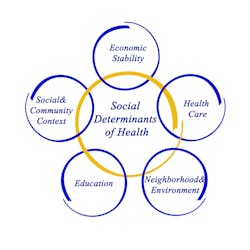The nonprofit Center for Open Data Enterprise (CODE) and the Office of the Chief Technology Officer at the U.S. Department of Health and Human Services (HHS) recently co-hosted a roundtable meeting on leveraging social determinants of health data. At the meeting, the North Carolina Department of Health and Human Services Healthy Opportunities program unveiled a FHIR-based, open source screening questionnaire. The screening tool asks patients about food access, housing and utilities, transportation and interpersonal safety. The answers to these questions can be delivered to health providers to better help address those needs.
The roundtable meeting brought together approximately 80 stakeholders from industry, academia, federal, state and local government, healthcare, and civil society to help HHS catalyze the use of SDOH data to improve health outcomes. A report summarizing the roundtable highlighted several data challenges, including ethical issues, lack of standards and interoperability, and lack of financial alignment.
In terms of ethical issues, the report notes that “developing social risk profiles could result in community redlining and individual stereotyping. Privacy concerns become a significant issue as a growing number of stakeholders are using individual-level commercial data that may be vulnerable to re-identification.”
It also notes that there are emerging privacy concerns around data that may be collected without explicit patient consent. Some companies are leveraging de-identified patient data from commercial sources, but could combine this data with other tools to re-identify the patient data.
In terms of data sharing and interoperability, the report notes that “without a standardized and widely adopted screening tool, SDOH data lacks an interoperable set of fields and may face challenges in data sharing and linkage. There are data gaps at each phase of the data collection lifecycle which hinder new technological applications such as machine learning and the development of impactful interventions.”
Financial alignment is also a key issue. The report notes that while some SDOH data may be included in a patient’s EHR, much of this data is not included due to inconsistencies around medical billing codes, payer models, and the lack of follow-up with community-based organizations. More incentives are needed to incentivize SDOH data across the entire healthcare sector, the report said.
In a keynote address at the roundtable, Karen DeSalvo, M.D., former Assistant Secretary for Health and co-convener of the National Alliance to Impact the Social Determinants of Health, provided five principles for moving toward value-based care and a more preventive, upstream model of healthcare:
1. Begin with the End in Mind: As data collection increases in scope, practitioners should always remember why they’re gathering the data and what outcomes they hope to achieve. These outcomes may relate to SDOH profiles, payment models, or identifying better public policies that solve issues of transportation, housing, or other social needs.
2. Develop Open Ecosystems: An open SDOH data ecosystem allows for health care providers to compete on what they do with the data, not on access to the data itself. Through open technologies like FHIR-based APIs, data should be used to develop more comprehensive longitudinal health care records that individuals can access.
3. Work in Partnership: SDOH data is bigger than a single sector and will require ongoing collaboration between the public and private sectors. It will also require the involvement of community-based organizations that have access to different, more granular data sources and have their own goals for data use.
4. Do No Harm: Providers shouldn’t only understand SDOH data through a medical lens nor use it to cherry-pick select patients based on their conditions. Patient and community data should be used carefully. It should not be used to profile individuals negatively or to stigmatize entire communities, but should be used in ways that build trust between the health system and those they serve.
5. Engage Strategically: HHS should lead work on an SDOH data strategy, that includes a data strategy, to provide guidance on the use of this data and insight into what works and what doesn’t. The private and public sectors should work together to develop this broad national strategy.


